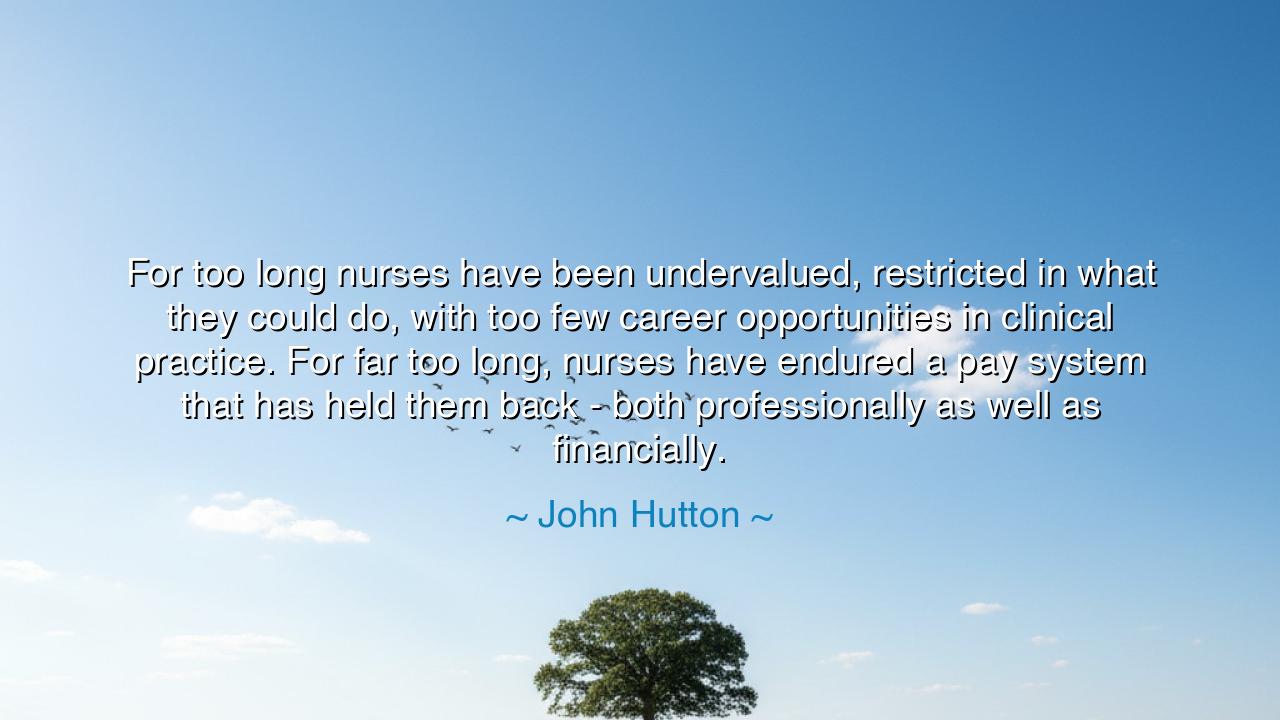
For too long nurses have been undervalued, restricted in what
For too long nurses have been undervalued, restricted in what they could do, with too few career opportunities in clinical practice. For far too long, nurses have endured a pay system that has held them back - both professionally as well as financially.






Hear the words of John Hutton, spoken with the weight of truth and sorrow: “For too long nurses have been undervalued, restricted in what they could do, with too few career opportunities in clinical practice. For far too long, nurses have endured a pay system that has held them back—both professionally as well as financially.” These words cut like a blade through the silence of complacency, for they reveal a deep injustice in the very heart of healing. The nurse, who stands as guardian of the sick and comforter of the dying, has long been praised in word but neglected in deed. Hutton’s voice calls us to reckon with this disparity.
The nurse is the unsung sentinel of the healing arts. While the physician prescribes, it is often the nurse who sits through the long hours, who tends the wound, who notices the subtle change that signals danger or hope. Their hands bear the burdens of the weary, their hearts absorb the cries of the suffering. And yet, as Hutton declares, they have been undervalued—praised as “angels,” yet denied the respect, authority, and reward their labor deserves. This contradiction is a wound in society’s conscience, festering across generations.
History bears witness to this struggle. In the Crimean War, Florence Nightingale transformed the chaos of military hospitals into havens of care, cutting death rates not with weapons but with order, cleanliness, and compassion. She proved that nursing was not servitude but a science, a discipline worthy of honor. Yet even she fought against the disdain of those who dismissed nurses as lesser. Her example shines across centuries: a reminder that the role of the nurse is as vital as the role of the physician, though society has been slow to grant them equality in recognition and reward.
The chains Hutton names are not merely of pay but of opportunity. For too long, nurses have been restricted in their scope, barred from advancing in ways their knowledge and experience deserved. In many lands, their voices have been stifled in decisions of treatment and policy, though they are the ones closest to the patient, the ones who see most clearly the struggles of care. By denying them growth, societies have denied themselves healing, for the wisdom of the nurse is a treasure often left unopened.
And then comes the matter of pay—that earthly measure of worth. Too often has the nurse endured wages that dishonor their labor, forced to sacrifice not only sleep and strength but also financial stability. This injustice corrodes the very system it sustains, for how can those who heal others thrive if they themselves are left in want? To starve the nurse is to starve the very foundation of health. Hutton’s cry is thus both moral and practical: honor them with fair reward, lest the pillar of care crumble beneath neglect.
The lesson for us is plain: we must not speak of nurses as noble while chaining them with undervaluation. Respect must be lived, not merely spoken. If we revere their role, let us prove it by granting them freedom to rise, authority to lead, and wages worthy of their labor. Every life touched by their care is testimony to their worth. To deny them is to deny the sacredness of healing itself.
And so, let your action be this: lift up the nurses among you. Speak on their behalf, support policies that grant them justice, and honor them not only with gratitude but with advocacy. In your daily life, recognize their unseen labor and offer respect as well as thanks. For the health of nations rests not on the shoulders of rulers alone, but on the hands of those who tend to the sick in the quiet hours of night.
Thus remember the words of John Hutton: “For too long nurses have been undervalued… For far too long, nurses have endured a pay system that has held them back.” Let this truth stir you to action, so that future generations may look back and say: here was the age when the nurse was finally honored as she ought to be—equal in dignity, secure in livelihood, and free to fulfill her calling to heal.






AAdministratorAdministrator
Welcome, honored guests. Please leave a comment, we will respond soon